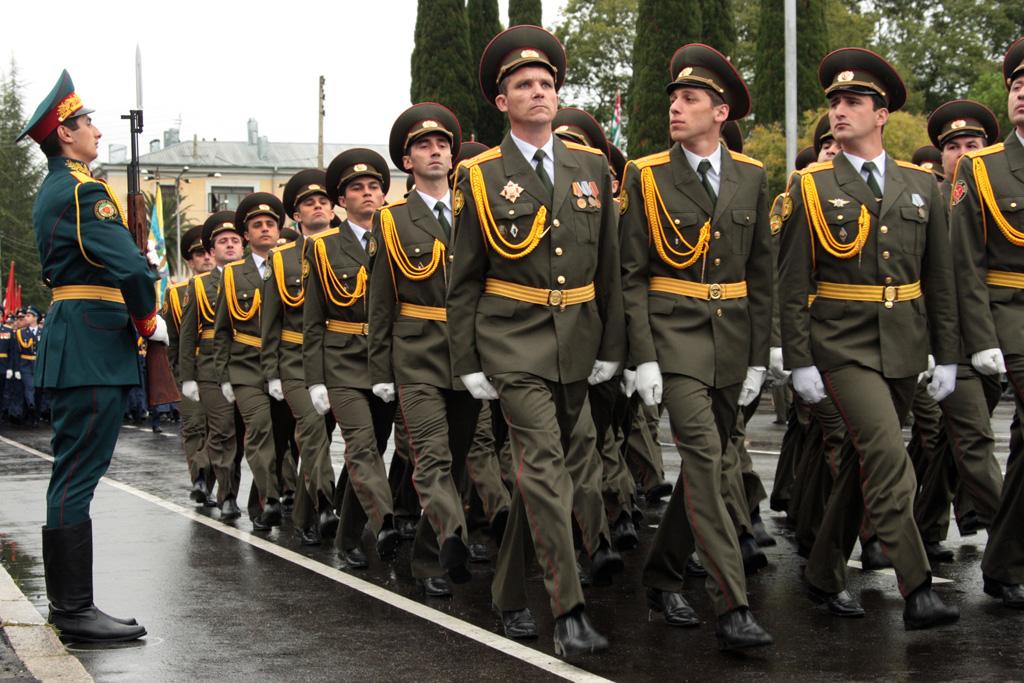Meanwhile, just outside Sochi…
Abkhaz troops in Sukhumi.
SUKHUMI, Georgia — With lush, rugged terrain and a refreshing subtropical breeze, this sunny swath of mountainous territory on the eastern Black Sea coast is an adventure tourist’s paradise.
Welcome to Abkhazia, a breakaway Georgian region just south of Sochi, the Russian resort where the Olympic Games begin on Thursday.
But while Sochi may be bustling with frenetic last-minute preparations for a huge influx of athletes and fans, less than 100 miles away the potholed streets of Abkhazia’s capital city are often deserted.
Many buildings are bombed out and hollow. In the off-season, an eerie silence hangs over rows of palm trees, broken only by the dull murmur of the sea.
Once the Soviet Union’s top vacation spot, Abkhazia’s crumbling seaside resorts provide a unique window into a past that has long since faded.
Rooftops of Sukhumi, Abkhazia. (Dan Peleschuk/GlobalPost via Instagram)
Few here appear to be preparing for a spillover of tourism from the Winter Olympics, a mere two hours’ drive away.
And it may be just as well: Russia has beefed up restrictions on its border with this largely forlorn region of about 250,000, recognized by only a small handful of countries and still reeling from a bloody war for independence from Georgia in the early 1990s.
That’s because Abkhazia is close to Russia’s insurgency-plagued North Caucasus. The region’s otherwise open border with Russia leaves it vulnerable to roaming Islamists who have threatened Vladimir Putin’s pet project with disaster.
After the recent murder of a Russian diplomat here, local officials say ensuring security in an already sensitive region — not cashing in on the Olympics, as many had long hoped — remains a priority.
“We have a responsibility for our territory,” said Viacheslav Chirikba, Abkhazia’s de facto foreign minister. “We shouldn’t allow it to be used for any unpleasant things.”
Vyacheslav Chirikba, foreign minister of Abkhazia, says Russian support for the unrecognized state is a "good deed." (Dan Peleschuk/GlobalPost via Instagram)
Once dubbed the “Soviet Riviera,” where the Communist elite flocked to its ornate, Stalinist resorts overlooking the sea, Abkhazia fought a devastating war with Tbilisi that killed up to 20,000 Georgians and around 4,000 Abkhaz, and left deep physical and psychological traces across the region.
Here in Sukhumi, the grandiose former government building remains gutted and burned. Billboards and murals celebrate local heroes as well as the region’s “victory” over Georgia. Low-budget films glorifying the war are shown often on its state TV network.
Locals say the conflict, which has fueled Abkhazia’s protracted dispute with Georgia, forms an important part of their character.
“It stays with us constantly,” said Beslan Gurjua, a 50-year-old researcher at a local humanities university here. “Tensions with Georgia aren’t abating, and in their souls many Abkhaz feel that the Georgians want some kind of revenge.”
Abkhazia declared independence in 1992, but it wasn't formally recognized by Russia until 2008, after Georgia's war with South Ossetia, another pro-Moscow breakaway region.
But Tbilisi, which enjoys widespread support from Western countries, vows to regain its territory.
That’s left Abkhazia to flounder in diplomatic uncertainty with a shaky economy, propped up in recent years with hundreds of millions of dollars from Russia.
But it’s part of the appeal to the few foreigners who make it here. Abkhazia is renowned for its wine, tangerines, and tasty — if carb-heavy — local cuisine, and nearly everything is dirt-cheap.
Tourist-class amenities are few, and free internet is almost nowhere to be found. But the rusting, Soviet-era piers that still stud its tranquil beaches help cast the region as a petrified slice of Soviet utopia.
There’s also the thrill of collecting a visa from a state recognized by almost no one.
The Sochi Olympics may have made that harder to do, however.
Last month, Moscow announced it would expand its security area several miles into Abkhazia, drawing the ire of Georgian officials who slammed the move as an illegal incursion into its sovereign territory.
Now, only specially registered vehicles will be allowed across the border.
Abkahzia's bombed-out former parliament building. (Dan Peleschuk/GlobalPost via Instagram)
Moscow's fears aren’t unfounded: Last September, a high-ranking Russian diplomat and his wife were killed in an attack outside their home here in what local officials say was a terrorist attack.
Two men from the predominantly Muslim North Caucasus, where Russia has struggled to suppress a simmering insurgency that kills hundreds each year, were arrested in connection with the murder.
Chirikba says Russia’s security forces are working in full cooperation with their Abkhaz counterparts.
“We have to be vigilant to save the lives of people,” he said. “It’s very simple.”
The drive from the Russian border to Sukhumi reveals how serious officials are.
Squeezed between steep mountains and the rustic coast, the road is littered with checkpoints manned by both police and what appear to be plainclothes security forces.
They stop handfuls of cars at once, forcing their passengers into document checks and spot interrogations.
More from GlobalPost: Popular film jokes about the Holocaust, Germans laugh
There’s little Abkhaz officials could do to object, even if they wanted.
As the region’s only patron, Russia holds enormous political and economic sway here. It also maintains troops in Abkhazia, which further exacerbates tensions between Sukhumi and Tbilisi.
That’s not likely to change anytime soon.
Arda Inal-Ipa, a civic activist in Sukhumi, says she’d like to see the region gain greater access to the outside world. However, that would mean formal recognition, a step no major power is likely to take.
“In the end,” she says, “I don’t understand who wins.”
Our coverage reaches millions each week, but only a small fraction of listeners contribute to sustain our program. We still need 224 more people to donate $100 or $10/monthly to unlock our $67,000 match. Will you help us get there today?
